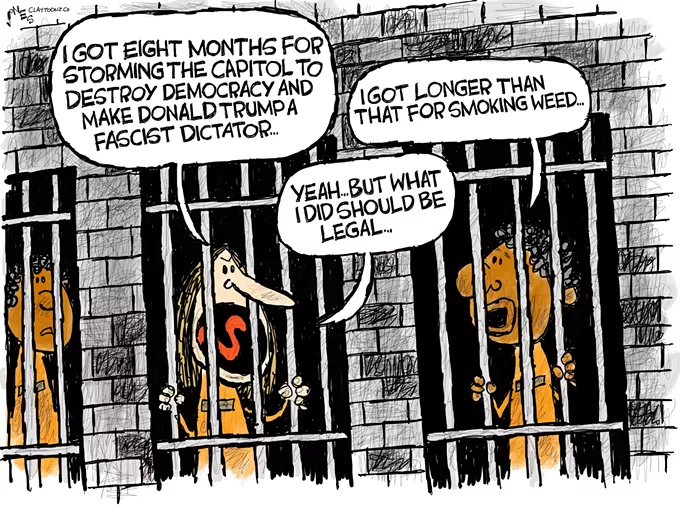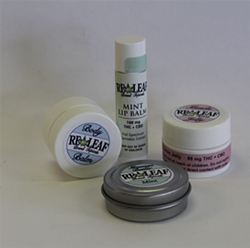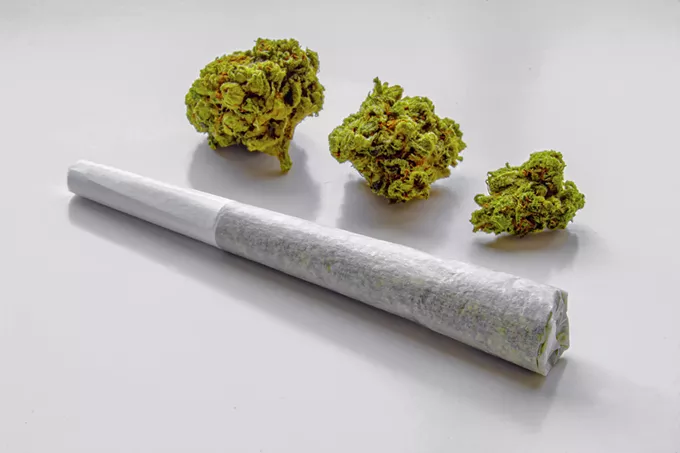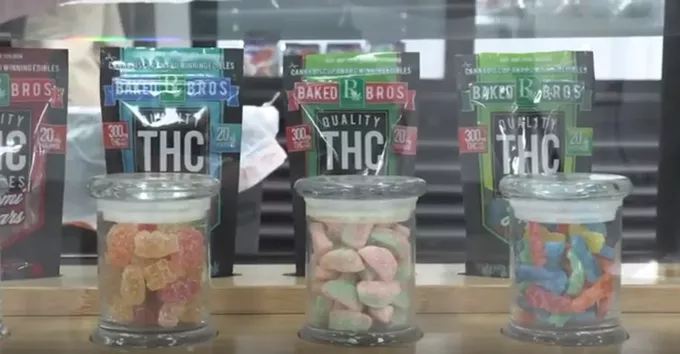Thursday, January 20, 2022
As part of a 24th birthday celebration, Cheba Hut is teaming up with the Last Prisoner Project, which is dedicated to cannabis criminal justice reform. The restaurant will donate $1 from every sub it sells today to the Last Prisoner Project and corporate HQ will match all donations.
Given that far too many people remain behind bars thanks to cannabis offenses, this seems like a tasty way to help in the effort to end incarceration for smoking weed.
Cheba Hut is open from 10 a.m. to 10 p.m. today.
Wednesday, July 21, 2021
Thursday, July 8, 2021
Monday, June 21, 2021
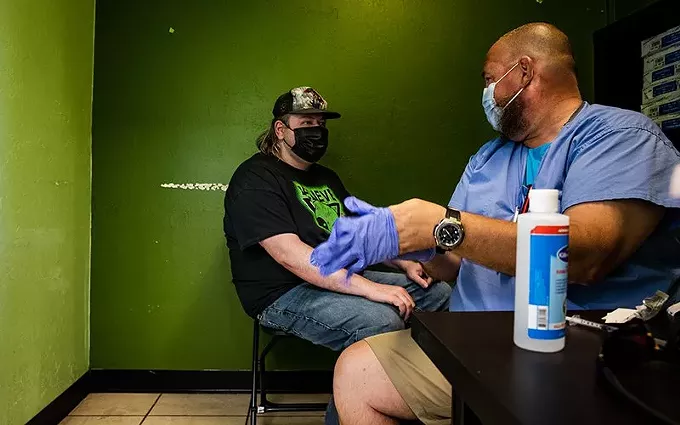
MESA – On a recent weekday morning, Paul Petersen of Florence was one of the first to arrive at Mint Dispensary to get something not usually offered at the cannabis shop: a free COVID-19 vaccine.
The 40-year-old had been holding off on getting vaccinated to see how others responded but was persuaded by an added perk: Mint’s Snax for Vaxx event. Mint gave away one free edible and a pre-rolled joint to anyone 21 or older receiving a Moderna vaccine.
Petersen said he took advantage of the opportunity to acquire “two things at once.”
“I’m comfortable with it now,” he said of the vaccination process, “but I didn’t trust the science before.”
With COVID-19 vaccination rates declining in Arizona and other states, public and private entities are using incentives to reverse the trend and get more shots into more arms.
From free doughnuts at Krispy Kreme shops to cold, hard cash from the state of California, individuals stepping up to get pricked can be rewarded in myriad ways.
In Arizona, Mint joined with Commerce Medical Group to provide vaccinations at pop-up clinics June 1 through 3 at its locations in Mesa, Tempe and Phoenix. Forty doses were brought to each location, and about two-thirds were distributed, said Kristy Jozwiak, a spokesperson for Mint.
Linzy Volm, a medical assistant for Commerce Medical Group who helped at the Mesa location, said more people turned up than she’d expected.
“I think it helps, giving a reward for (the shots),” she said. “But it kind of sucks that it has to come down to people being bribed to get vaccinated.”
Thursday, April 22, 2021
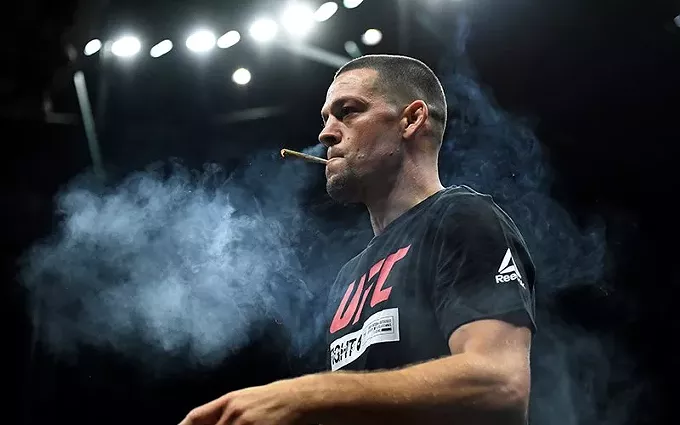
PHOENIX – The unofficial marijuana holiday, April 20, has become a popular day around the world.
This year, it comes at a time when the marijuana landscape is drastically changing in terms of its acceptance from a recreational standpoint and in the medical field. It’s also a substance that has been the root of much controversy in the sporting world, a substance some athletes are pushing their respective leagues to accept as a form of alternative medicine, especially for its potential value in phasing opioid use out of sports.
Jake Plummer, the legendary Arizona State quarterback and former Arizona Cardinals signal-caller, is among those athletes pushing for marijuana reform in sports. He believes the benefits far outweigh the potential negatives.
“It could help you sleep, reduce anxiety, inflammation, arthritis,” Plummer said. “Here we are talking about football players with inflammation, the onset of arthritis, with sleep issues, with anxiety, PTSD and all this crazy stuff, and here’s this natural plant that can help with all that.”
Before the 2020 NFL season, the league announced drastic changes to its drug policy as part of its new collective bargaining agreement. The window for the NFL to test players for THC, the main psychoactive compound in cannabis that produces a high sensation, was narrowed from four months to two weeks at the outset of training camp.
Players who test positive for THC will only receive game suspensions if they exceed the new 150 nanogram limit, a 115 nanogram increase from the former policy.
Thursday, April 15, 2021
Copia Infusions announced Noonan's passing after a four-year battle with leukemia.
“Peggy was a pioneer in life, as in with business, and was one of the early trailblazers in the Arizona medical marijuana industry," said a Copia press release. "For nearly the past 10 years, Peggy put her extraordinary energies and talents into building business enterprises that have bloomed into Copia, an industry leader in infused products with the first scratch made cannabis kitchen in Arizona and with leading products, like OGeez!”
Noonan's son, Bran Noonan, will take over her work at Copia.
“For those who knew my mother, it goes without saying that she loved this company and the Arizona community, and bringing the passion she put into the company to others,” Bran Noonan said. “My mother possessed an unmatched entrepreneurial spirt, and as the company moves through 2021 and beyond, we will do so in her honor and by continuing to build upon her legacy.”
Noonan started her career in cannabis right out of college, “at a time that was all about bringing peace and love to the world, while striving for a higher consciousness in making a difference,” according to Noonan's bio on the Copia website.
In 2013, her passion for cannabis infusion was re-ignited with the launch of the Arizona Medical Marijuana program. In late 2017, Noonan was diagnosed with Acute Myloid Leukemia and fought the disease with several of her own products, particularly Copia’s homeopathic cannabis tincture oil.
During her fight, she continued researching ways to make products even healthier while maintaining mainstream taste. After a journey through traditional and cannabis medical treatments, Noonan announced in 2018 that she was cancer-free. She was again diagnosed with Leukemia in late 2019 and succumbed to the disease early this month.
After being involved in the industry for 40 years, she was a believer in the need for education, standardized testing and proper dosing. She held regular training sessions with staff members at dispensaries and cannabis education schools, teaching aspiring professionals about proper dosing and how medical marijuana can better serve patients.
Noonan was also on the Labeling and Packaging Committee with the Arizona State Department of Health Services for best practices in dosage and safety labeling and packaging.
A native New Yorker, Noonan graduated from Arizona State University and Parsons School of Design. She spent time as an interior designer, developer and general contractor in New York before moving to Arizona. Noonan also owned Reliance Commercial Construction Inc., which specializes in MMJ dispensaries, cannabis production facilities, and cultivation sites, with a specialty in food services and restaurants.
Information for this report was taken from Peggy Noonan's bio on azcopia.com.
Thursday, January 28, 2021
Desert Bloom Re-Leaf Center, 8060 E. 22nd St., opened to recreational sales yesterday.
Desert Bloom, which carries a wide range of flower, edibles, concentrates, lotions and similar products, follows midtown dispensary Harvest, which began recreational sales last Friday.
Other dispensaries are expected to start offering the sales in the coming weeks after the Arizona Department of Health Services allowed recreational cannabis sales to begin, letting dispensary owners know adult-use recreational sales can move forward as soon as licenses are approved and dispensaries are set up to handle both aspects of the market.
Applications for adult-use sales began on Jan. 19, but were restricted to existing medical marijuana establishments that qualified for early "dual license" applications. The language of Proposition 207 that legalized cannabis use for adults over the age of 21 gave AZDHS two months to review and approve applications.
By the end of last week week, though, 86 licenses had been approved. Several Tucson dispensaries have also been authorized for recreational sales, including Desert Bloom Re-Leaf Center, Green Med/Purple Med (6464 E. Tanque Verde and 1010 S. Freeway Drive), Prime Leaf (4220 E. Speedway and 1525 N. Park Ave.) and Nature Med (5390 W. Ina Road in Marana).
Nature Med has announced it will open to recreational sales on Feb. 25 and Prime Leaf is shooting for March 1.
Most dispensaries are not yet ready to start recreational sales, as there are several barriers to immediately expanding, not the least of which is the current state of the coronavirus pandemic still raging through the state.
Find more details here.Friday, January 22, 2021
Harvest Dispensary became the first Tucson-area dispensary to start selling recreational marijuana yesterday, with long lines forming outside the midtown outlet at 2734 E. Grant Road.
Harvest's opening came after the Arizona Department of Health Services gave the go-ahead last week for recreational cannabis sales to begin, letting dispensary owners know adult-use recreational sales can move forward as soon as licenses are approved and dispensaries are set up to handle both aspects of the market.
Applications for adult-use sales began on Jan. 19, but were restricted to existing medical marijuana establishments that qualified for early applications. The language of Proposition 207 that legalized cannabis use for adults over the age of 21 gave AZDHS two months to review and approve applications. As of Wednesday, Jan. 21, there were 62 applications for so-called “dual-licenses.”
Most cannabis advocates and those following the process expected sales to begin in late-March or early April, but with last week’s announcement, the door opened for an accelerated timetable.
Several other local dispensaries have also been authorized for recreational sales, including Green Med/Purple Med, Prime Leaf and Nature Med. But some of those dispensaries are not yet ready to start recreational sales, as there are several barriers to immediately opening up adult-use sales, not the least of which is the current state of the coronavirus pandemic still raging through the state.
Aside from that, some dispensaries might run into space and inventory issues and will need to have new operating procedures and dual point of sales systems to deal with differing tax rates and cost structures.
There is also a looming staffing shortage, as dispensary employees will now have to have multiple certifications to work in the industry.
“For us, it’s COVID—public and employee safety,” said Brian Warde, co-owner and CEO of Prime Leaf in Tucson. “Realistically you could have 150 people in line and might see over 1,000-plus patients a day most the days.”
Just from the standpoint of current patient patronage, that means to properly social distance Prime Leaf would need the equivalent of three football fields of space to accommodate the patient load. Warde says he is also waiting for inoculations for his employees that realistically won’t happen before March.
“Managing the inventory and workflow to ensure medical patients don’t run out of what they need, is also a big consideration,” he said. “We want to give patients what they have come to expect, and not allow the adult-use market to alter our patients’ experience. So slow rolling it to make sure we are in the best possible position to meet everyone’s expectations.”
This post has been updated.Wednesday, December 2, 2020
PHOENIX – Recreational use of marijuana will soon be legal in Arizona, thanks to Proposition 207’s easy passage, but economic and logistical hurdles remain before Arizonans will feel the effects.
The measure – approved by more than 60% of voters in unofficial results from Nov. 3 – decriminalizes recreational marijuana use and possession for those 21 or older; allows minor, nonviolent marijuana offenders to petition to have their criminal records expunged; and imposes an excise tax to support underfunded programs across the state.
Once the Arizona Secretary of State’s Office certifies the proposition, which is expected to happen in December, the use and possession of up to 1 ounce of marijuana will be legal except in public spaces. Despite the law’s passage, however, marijuana possession, distribution and use remain federal crimes.
Dispensaries and growers, which have become a familiar presence in Arizona since voters narrowly approved marijuana for medical use in 2010, will have to wait for state approval to sell marijuana for recreational uses. Application for state licenses is expected to open in January, and organizers of Proposition 207 are predicting an April 5 launch for recreational sales.
“I think there’s going to be a lot of very curious people that want to walk into the dispensary because they weren’t able to do that before,” said Raul Molina, chief operations officer at the Mint Dispensary in Tempe.
Clearing criminal records
A key element of Proposition 207 is the opportunity to expunge a criminal record, which can impede employment, nullify the right to vote and harm reputations.
Proposition 207 is the first voter measure in Arizona that offers expungement, according to Jared Keenan, a senior staff attorney at American Civil Liberties Union of Arizona. But the process may differ in each of Arizona’s 15 counties, depending on the population and whether the county attorney supported the measure.
Prosecutors can petition against moves to expunge records. The Maricopa County Attorney’s Office has not given a stance on expungement but has announced it will immediately drop all pending and unfiled charges of marijuana possession based on “the will of the voters.”
Currently, Keenan said, all marijuana convictions are felonies, which means convicts could lose their right to vote, their access to public housing and food assistance, and their eligibility for federal student loans. A criminal record also makes it harder to get a job.
Friday, November 13, 2020
LOS ANGELES – California’s record wildfire season has left many cannabis growers concerned about Croptober – the primary harvest season for marijuana sold in California, where it’s legally consumed.
As fires continue burning into the record book, California growers – whose operations are federally illegal and therefore difficult to insure – are demanding protections for their billion-dollar industry.
Cannabis farms, as well as wineries, agricultural farms, have been hard hit by the wide range of California fires, and the toll faced by cannabis farms is among the worst.
Since January, California has had more than 9,177 wildfires burning more than 4.1 million acres, which is more than double the old record in 2018, according to Cal Fire.
High in the hills overlooking the Russian River Valley in Sonoma County, Kila Peterson and her daughter, Keala Peterson, are partners on Sweet Creek Farm, a small family-owned and licensed cannabis farm that also grows avocados and sweet bananas.
The cannabis venture started more than 10 years ago when Kila began growing it to produce CBD for her father, who had cancer. The mother-daughter approach is rooted in sustainability; their techniques include a solar-powered irrigation system fed by rainwater catchment and pollinator-friendly companion flowers, according to the farm’s website.



